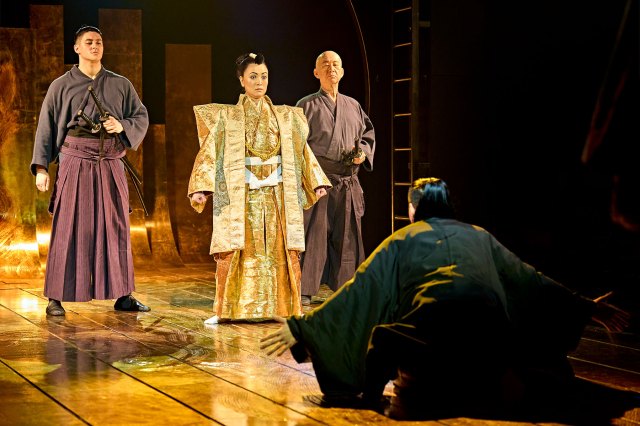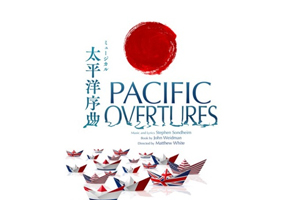Pacific Overtures at Menier Chocolate Factory – review
The Umeda Arts Theater co-production runs until 24 February

It’s been nine years since London last saw a production of Stephen Sondheim’s Pacific Overtures – a musical about the 1853 opening up of Japan to the West at the barrel of a gunboat.
The show, first seen on Broadway in 1976, is one of the least produced Sondheims, and an extensive programme note by its book writer John Weidman explains a production history that has always been troubled by the complexity of its concept.
This is an American musical about the destruction of Japanese isolation by the American Commodore Perry, written from an imagined Japanese point of view, by “two middle-class white men living in New York.” It doesn’t do character as such, but is concerned with the sweep of history, the way a country moved from 250 years of total isolation to commerce and combat in the modern world.
It is one of Sondheim’s most overtly political musicals, and most savage satires, yet it contains moments of luminous beauty – “Poems” a song built around pretend haikus as two men go for a walk, and “Someone in a Tree”, a beautiful meditation on the fragmentary nature of history. It requires the delicacy of touch of a screen painter to get all its nuance and balance right.
This Menier Chocolate Factory revival is a co-production with the Umeda Arts Theater, and the production was first seen in Tokyo and Osaka, which solves some problems. The company uses the chamber version of the show created by Sondheim, Weidman and Hugh Wheeler in 2017. The Umeda production was originally performed in Japanese, and there’s quite a lot of me that would have liked to see that here, rather than a Japanese and Asian cast performing in English.
But Matthew White’s staging is imaginative and assured. It begins in a museum, with the cast walking around the exhibits; then Jon Chew’s punky-haired ‘reciter’ uses an electronic remote control to take us back to a time when Japan was “floating in the middle of the sea” cut off from the rest of the world.
This number, like the rest of the show, is staged with minimalist flair, the tiny cast and Ashley Nottingham’s stylised choreography making maximum impact in the cramped setting. Paul Farnsworth provides an elegant set, with luminous circles of light and a circular golden door at one end of the traverse playing area from which characters – the golden-kimoned Shogun, the bright geisha girls twirling parasols – can suddenly emerge.
Gunboats arrive in the shape of black paper boats. Perry’s battleship is made of looped black silk. The fiercely clever song “Please Hello”, where admirals from America, Britain, Holland, Russia and France are each given a precisely parodic style (mimicking Sousa, Gilbert and Sullivan, Offenbach and others), in which to make their escalating demands of their Japanese hosts, is staged with each wearing a boat around their waists. (Costumes by Ayako Maeda).
There is much to admire as the pace accelerates as the evening progresses, and the humour and the sadness both become more intense. Yet the power of Sondheim’s lyrics is sometimes swallowed by a sound balance that prefers the oomph of Paul Bogaev’s lively orchestra, and the singing deliberately ignores the more lyrical wonders of the score.
In the same way, the broadly comic tone of much of the playing makes the darker threads of the show’s conclusion hard to wind into the whole. Chew is an excellent narrator, and Sadri Oda brings comic brio both to the Shogun and to the geisha Madam, while Joaquin Pedro Valdes charts Manjiro’s journey from Americaphile to committed Samurai with charismatic conviction.
Yet the melancholy strain that underpins the show, the sense of something valuable lost as well as modernity gained, somehow goes missing.

















